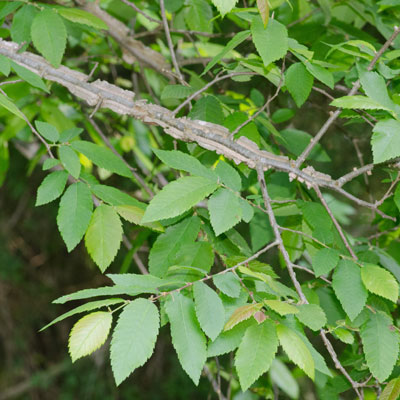Winged Elm
Ulmus alata
Family: Ulmaceae
Natural History

Leaves and "winged" branch of winged elmPhoto credit: Suzanne Cadwell (Flickr ID scadwell) | Used under a Creative Commons license
Winged elm, also called corked elm or wahoo elm, can be distinguished from other elms by the woody, wing-like growths along the branchlets. They are often irregular and may appear as warty growths or knots on one or both sides of the twigs.
The wood is very flexible and springy but is also hard and resists splitting. It is categorized as a rock elm or hard elm and is used in flooring, boxes, crates, and furniture. The flexibility of the wood is particularly useful for rocking chairs or curved pieces. Winged elm is the wood of choice for hockey sticks, due to its resistance to splitting. The fibrous inner bark is used to make baling twine.
Winged elm is a common street and shade tree that is adaptable to a variety of soil and habitat conditions; however, it is susceptible to Dutch elm disease in the northern parts of its range.
This species provides a nutritious browse for white-tailed deer, especially in the spring, when the vegetation is tender and most easily digested. The seeds are eaten by rodents, small mammals, and numerous birds.
Winged elm is native to the southeastern corner of the United States, from southern Virginia west to the Ohio valley and Texas, and south into Florida.
